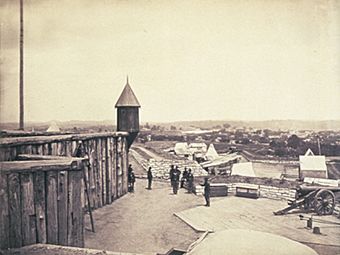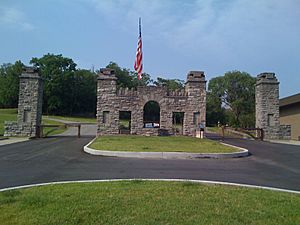Fort Negley facts for kids
Quick facts for kids |
|
|
Fort Negley
|
|

Fort Negley in 1864
|
|
| Location | 1100 Fort Negley Blvd. Nashville, Tennessee |
|---|---|
| Nearest city | Nashville, Tennessee |
| Area | 180,000 sq ft (fort only) |
| Built | 1862 |
| Architect | James St. Clair Morton |
| NRHP reference No. | 75001748 |
| Added to NRHP | April 21, 1975 |
Fort Negley was a large fort built by Union soldiers during the American Civil War. It is located about 2 miles south of Nashville, Tennessee. This fort was the biggest inland fort constructed in the United States during the war.
Contents
Fort Negley: A Civil War Stronghold
Fort Negley was a very important military base. It helped protect Nashville after Union forces took control of the city.
Building a Giant Fort
After Confederate soldiers lost battles at Forts Henry and Donelson in February 1862, they left Nashville. Union forces quickly moved in and started getting ready to defend the city.
The biggest defense they built was Fort Negley. It was shaped like a star and made from limestone blocks. The fort sat on top of St. Cloud Hill, south of the city. Captain James St. Clair Morton was in charge of building it.
The fort was made using 62,500 cubic feet of stone and 18,000 cubic feet of earth. It cost $130,000 to build. Many people worked on the fort's construction. This included local enslaved people, newly freed slaves, and free Black people who were forced to help. Records show that 2,768 Black individuals were officially involved in its construction. The fort was named after General James S. Negley, a commander in the Union Army.
Fort Negley's Role in Battle
When the Battle of Nashville happened in December 1864, the main fighting took place further south. Fort Negley, despite its impressive size, did not play a major role in the actual battles.
Soon after the war ended, the fort was left empty and started to fall apart. For many years, you could still see its shape in the growing woods. During the Reconstruction period, the area was used as a meeting place by the Ku Klux Klan, a group known for promoting racial hatred.
Protecting Fort Negley's History
Over the years, people have worked to save and restore Fort Negley. It is an important historical site.
Early Efforts to Restore the Fort
In the 1930s, the Works Progress Administration (WPA) started a big project to restore Fort Negley. However, as soon as the restoration was finished, the United States entered World War II. There wasn't enough money, workers, or interest to open the fort as a historical site.
After the war, the fort was neglected again. It became a place for vandalism and minor crimes. Eventually, people were not allowed to enter the site, and the area became overgrown with trees.
A Park and a Museum Grow Nearby
Even though the fort itself was closed, the land around it became a city park. First, it had baseball and softball fields for kids and adults. Later, Herschel Greer Stadium, a Minor League Baseball ballpark, was built there. The Adventure Science Center, a science museum, was also built on a nearby slope. Most visitors to the stadium and museum didn't know about the historic fort on the wooded hilltop.
Modern Restoration and Discovery
In the early 2000s, people who wanted to save historical places finally got enough money for another restoration project. On December 10, 2004, Fort Negley reopened to the public after many years. This restoration didn't try to make the fort look exactly like it did during the Civil War. Instead, workers made the ruins stable and easier to see. They removed large trees and moved some stone blocks back to their original spots. Today, you can see a mix of the original fort and the WPA restoration. In 2007, the city spent an extra $1 million to build a visitor center.
In 2017, there was a plan to redevelop the Greer Stadium site, which had been empty since 2015. This plan aimed to highlight Fort Negley's history with educational spaces and walking trails. It also included building new things like music and art areas, a community center, and affordable housing. However, this plan faced criticism. People were concerned about the important Civil War and African American history at the site.
In January 2018, the developers canceled their plans. Archaeologists discovered unmarked burial sites of enslaved people who were forced to build Fort Negley. These sites were on the edge of the Greer property. Nashville's Mayor Megan Barry said she wanted the site to honor the history of those who died building the fort.
Fort Negley Today
Fort Negley is now recognized as a Site of Memory by the Slave Route Project of the United Nations Educational, Scientific and Cultural Organization (UNESCO). This means it is an important place for remembering the history of slavery. In 2022, a master plan was completed to guide the restoration of the site as a park and to help people understand its complex history.
See also
 In Spanish: Fuerte Negley para niños
In Spanish: Fuerte Negley para niños
 | Jessica Watkins |
 | Robert Henry Lawrence Jr. |
 | Mae Jemison |
 | Sian Proctor |
 | Guion Bluford |


